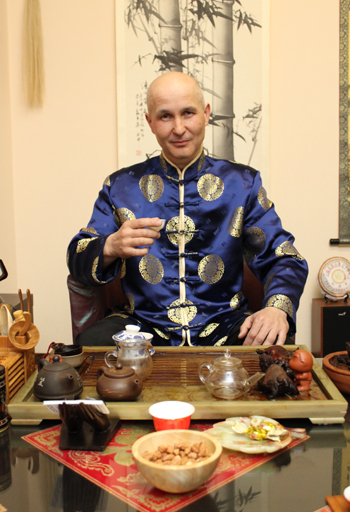Uphill battle of Chinese tea in Russia
Optimism against all odds
Notwithstanding the fact that nowadays business climate for Chinese tea market in Russia doesn’t look appealing, Russian businessmen haven’t lost hope. According to Denis, he keeps promoting Chinese tea wherever he can. “Since I work in the movie industry, I use every opportunity to promote the Chinese tea culture. Chinese tea has become part of my life along with the Chinese culture,” Denis added.
|
 |
|
Fanil Makhmutov carries out a tea ceremony. [Photo provided by Anastasia Sukhoreskaya] |
Another entrepreneur and tea ceremony master Fanil Makhmutov from Kazan, Tatarstan Republic, who has always expressed great interest in Chinese tea and culture, only recently launched a tea club called “Kazancha” in Kazan with the main focus on tea from China. Despite the economic pitfalls, he keeps coming to China on a regular basis, eager to get a better understanding of the Middle Kingdom, improving on his language skills, and exploring new aspects of the great culture of China.
Moreover, rapidly developing ties with China also add to the spark of interest toward China in Russia. Experts noted that more people, due to the growth of exchanges and tourism in both countries, now became aware of good qualities of Chinese tea, they could name different kinds of it and even had their favorite, like oolong, pu’er, dahongpao, flower teas. Almost all big cities in Russia have tea clubs and tea houses and many supermarkets offer made-in-China tea.
After the economic crisis broke out, many tea sellers who used to deal with Russia now distribute tea to other countries and regions. Alexander Zhiryakov, whose tea production suffered from the economic slowdown, claims that sales in the US and Europe helped the company to stay on balance.
Tea providers in China who work with Russia noted that the tea market in Russia shrank by two thirds. For instance, a tea shopkeeper named Lin who collaborated with Russia since 2005 provided tea to more than 20 tea shops and single tea distributers in Russia. However, after the economic situation worsened the majority of them shut down their shops. But, in comparison with other countries, Lin claims, Russian market stills look profitable.
The author is a senior blogger with China Daily Website.









